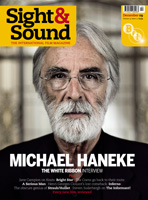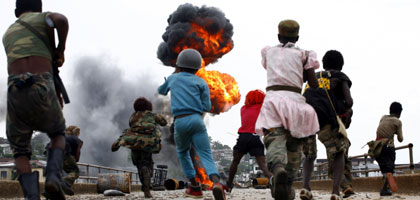Primary navigation

France/Belgium/Liberia 2008

Reviewed by Trevor Johnston
Our synopses give away the plot in full, including surprise twists.
An unnamed African nation. Rebel-army child soldiers, led by 15-year-old Johnny Mad Dog, attack a village; they force a small boy to kill his father and pressgang him into becoming their latest recruit. Drugged and brainwashed by their superiors, the platoon then take the government radio station. Meanwhile, across town, 16-year-old Laokole is worried for her infant brother Fofo and her amputee father. Before their next mission, Johnny's band dance round the campfire, believing themselves impervious to bullets. Subsequently, Laokole sees them shoot another young boy - but when Johnny alone encounters her in a stairwell, he lets her go. Fofo disappears from his hiding place. Laokole bribes a stranger to take her wounded father out of the city, only for him to die before reaching safety.
Back at base, Johnny renames a female comrade 'Lovelita' and has sex with her. A UN convoy pours into the city, but the rebels have seized control. Partying to celebrate, Lovelita is angry to see Johnny with another girl, and in the ensuing fracas is shot by older fighters. Johnny sheds tears for her; the next morning he's told that the new governing party no longer employs child soldiers, so the platoon is disbanded. Johnny is assigned to security detail at a refugee camp, where Laokole denounces him as a murderer. He defends his actions as a soldier, but her response is to beat him to death with his own rifle.
It's only too easy to be suspicious of a white French film-maker tackling the nefarious exploits of child soldiers in some unnamed recent African civil war, given the potential for yet another hackneyed effort stimulating our outrage with a voyeuristic trawl through the 'dark continent'. With this adaptation of a novel by Congolese writer Emmanuel Dongola, you do however sense that director Jean-Stéphane Sauvaire has done his damnedest to eschew that particular celluloid template. The subject of children forced to kill and maim in the service of some ideological agenda is obviously morally repugnant in the extreme, yet the film refuses to settle for an appalled 'tsk tsk'.
From the very first scene, Sauvaire prompts the audience to reflect on the material by depriving them of their narrative bearings. We're pitched right into an attack by gun-toting kids on some petrified civilians, the soundtrack a disorientating cacophony. We don't know where we are but it's some sort of hell. The template is set for how Johnny Mad Dog and his raggle-taggle platoon operate, as they force a terrified young boy at gunpoint to shoot his own father, then pressgang him into becoming their newest recruit. As we soon see, detaching the child from parental ties is only the first step in the conversion to the rebel agenda, achieved by brainwashing, drugs, booze, peer pressure and the ongoing power trip of heavy weaponry.
The detailing of the process that turns innocent children into ruthless killers provides some basic background, and a skeletal plotline derives from the ominous prospect of Johnny and his crew crossing paths with teenage girl Laokole (a Bible-reading exemplar of goodness), but elsewhere Sauvaire's non-judgemental reserve leaves us to map this terrifying moral terrain for ourselves. Although the film is properly wary not to revel in sensationalism, amid the horrors Laokole, Johnny's savagely capricious cohort No Good Advice and Johnny himself all manifest care and affection for others. However, these glimpses of their better selves contrast with the surrounding carnage - and indeed angelic Laokole's last-minute lapse into vengeful psychosis as she beats Johnny to a bloody pulp. No cosy final-reel uplift here.
With Jackson Tennessee Fourgeaud's discordant score a magnificently unsettling noise, and the whirl of patois and gunfire reverberating round the crumbling post-conflict Liberian locations vivid to the point of overload, it's demanding to keep your analytical wits, though certainly worth the effort. As No Good Advice dances round the campfire, his features distorted with rage, Sauvaire certainly flirts with images redolent of demonised negritude - yet simply by allowing us a window on the children's experiences, his film begins the process of humanising them (many of the performers were indeed involved in similar civil conflicts). That said, sundry allusions also connect to the western viewer in a more implicatory manner, positioning the children's story within the wider catalogue of colonial history (we hear a snatch of a Martin Luther King speech connecting the lot of the African American with the legacy of slavery) and perhaps flagging up the notion of these fancy-dressed junior warriors' deadly play exposing fantasies of power and sexual potency lurking in the collective unconscious (hence the gangsta-rap references and the possible reading of events as a real-life videogame shoot-'em-up).
It's a lot to take on board, but in resisting trite moral summations, the film begins a process of investigation for the viewer to continue. For this and so many reasons, it's a haunting and provocative glimpse into the heart of darkness.
Film of the Month: Daratt reviewed by Roy Armes (August 2007)
Invisible classics: Mark Cousins on African cinema?s buried treasure (February 2007)
Unknown soldiers: Ali Jafaar on Rachid Bouchareb?s Days of Glory (April 2007)
Film of the Month: Bamako reviewed by N. Frank Ukadike (February 2007)
Film of the Month: Moolaadé reviewed by Philip Kemp (June 2005)